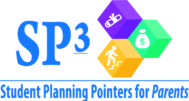Financial Decisions Require Knowledge and Caution

Becoming financially capable doesn’t happen overnight and isn’t without struggles along the way. Good money habits should be learned at an early age and strengthened throughout a lifetime.
Why It Matters
- Handling finances is a lifelong task.
Managing money is a learned behavior and early exposure to simple banking functions will help your student gain competency on the road to financial stability. - Starting early is beneficial.
The phrase “it’s never too early to start” applies to financial literacy. Learning personal money habits at an early age is a good foundation for higher level financial concepts later on and helps to avoid potential pitfalls.
What Your Student Can Do Now
- Determine individual money habits.
Many adults might not be aware of what types of money habits they have, but a unique and fun card game called Money Habitudes® can pinpoint them for you and your student. You can both find your money personality from six different categories — Status, Security, Giving, Carefree, Planning and Spontaneous. Understanding individual spending habits and attitudes really helps in developing a healthy relationship with money and balancing impulsive behavior. - Use a debit card.
Using a debit card for incidental purchases helps your student learn money management skills. However, help your student realize that using one is similar to exchanging cash with a vendor because it is immediately deducted from the account — there should be money in the account to cover the purchase. Many financial institutions have overdraft protection available, where a transfer from a savings account is automatically done to avoid overdraft fees. The debit card could also be set up to reject purchases that will potentially overdraw the account. - Find other ways to pay.
Caution your student about the ways debit cards can be skimmed at points of sale. Different types of electronic payments, such as Venmo or PayPal, and swipe-to-pay apps (Apple Pay, Android Pay, Google Wallet) can be used to combat debit card scams. Research them carefully and agree on using one or two together. - Monitor accounts.
Help your student set up online banking through a phone app. Monitoring bank accounts helps prevent potential identity theft. Even with the safeguards that financial institutions have in place, it’s beneficial to keep a watchful eye on banking activity. Thieves employ very clever measures and do not discriminate among their victims — everyone is at risk. No doubt you’ve heard the stories and the studies indicating identity theft occurs every two seconds. We offer a handout explaining different ways information is stolen and protective steps you and your student can take to avoid becoming a victim.
What Your Student Can Do Later
- Change any poor money habits.
Make a resolution and set some goals to alter any poor habits. Perhaps your student should put aside a debit card for a while and resolve to use only a certain amount of cash each day to avoid over-spending. Or if your student scores high in the Giving category in the Money Habitudes game, open a separate savings account to save up a portion of job wages to donate to a charitable cause. Taking small steps toward any positive change is empowering and satisfying. - Knowledge is power.
Check into any high school classes that offer financial education curriculum. Financial literacy might be included somewhere in the curriculum, whether in an economics or math class, but another course may offer more in-depth information related to investments or personal finance for your student to explore. - Educate yourself about credit.
Federal law restricts lenders from offering credit to anyone younger than eighteen years of age. But it’s helpful to know how credit works now in order to have healthy credit later on. Credit cards are a useful tool, but only when used wisely. They offer a higher risk for establishing poor credit than good credit and should really be considered a high-interest rate loan. Credit cards also create a mindset of “buy now, pay later,” which contradicts the concept of saving for large purchases.
What You Can Do
- Have an honest discussion.
After playing Money Habitudes, discuss the results with your student. If you see ways to improve or strengthen your own habits, agree to work on them with your student monitoring your progress. Set some goals yourself and create a friendly but competitive atmosphere to incentivize you both. - Offer suggestions about saving and spending.
Determine an amount that should be saved from any money your student receives from earnings and cash gifts, which can prompt a lesson in compounding interest. Savings can be earmarked for a special purchase or for education after high school, emphasizing goal-setting and ownership. Consider making your student responsible for paying for certain expenses, such as gas for the car, clothing or spending money. Be present during the first several transactions until your student expresses some comfortability and familiarity with making purchases. - Discuss the pros and cons of credit cards.
If your student demonstrates responsible spending and banking habits, consider making him an authorized user on one of your cards. Any purchases he makes with it are then his responsibility to pay. Rescind the card if that doesn’t happen. Eventually help your student research credit card options with any potential rewards programs, rebates or cash back initiatives, etc. Regularly using the credit card and paying off the entire balance each month will create the positive credit history both you and your student want.
ISL Education Lending does not endorse nor receive a commission from third party products linked in the articles.
For a short time only, and in celebration of April being Financial Literacy Month, all new and currently registered Iowa parent participants will be eligible for a one-time drawing for a chance to win a $1,000 529 college savings deposit. Ten random winners will be chosen to receive $1,000 following the special giveaway’s closing date of April 30, 2025. New participants just need to register before April 30, 2025. See rules for details.
Next Steps
Be sure to complete the survey questions at the end of this article to be entered into the 529 deposit giveaway!
Additional references, handouts and talking points are available in the right sidebar to use at your leisure. They may prove beneficial to reference now or after receiving future emails — we’ll leave it completely up to you. Use our emails like a recipe for a successful outcome — assemble the recommended ingredients and then follow accompanying directions to add flavor and depth.
